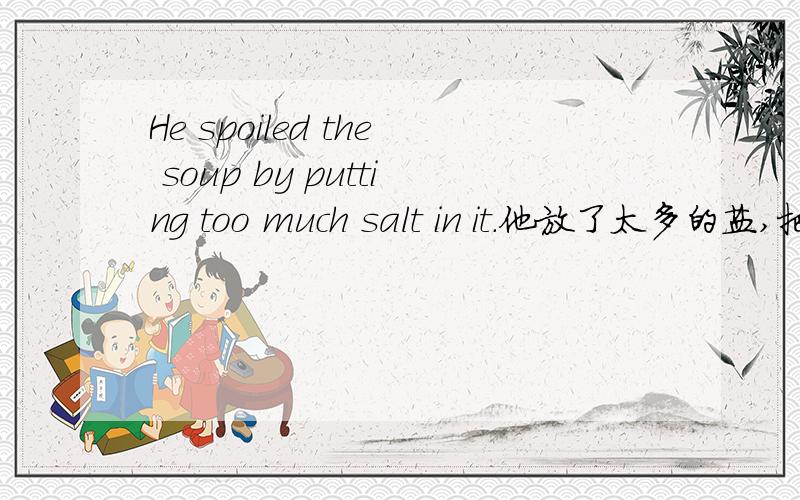He spoiled the soup by putting too much salt in it.他放了太多的盐,把那盘汤糟蹋了.为什么用by啊?too是做什么的啊?too一般不是放在句尾的吗?put为什么要用动名词啊?最后的it有用吗?
来源:学生作业帮助网 编辑:作业帮 时间:2024/11/17 06:33:41

x���N�@�_eº)/�����!�ic���J��Ԙ�Ƙ�ay秬|o4,��n���{����Ii�"�kpV�**����Xn�!�(�yZCZ����@2I0b�
�\�����5���e��S>��_އ�
(D�ڐ@'� ��
ZEpd�5ܴ�i�����LV6���z>����.R8�ExѷY�h� �|���
��S��2f^7�T����0��
f2�C�X|
8�
��5��y� �����,$����Fk��
_'p�lx`��\:u��%�����pi�-�Li��(�Dx��=�碔��R���-ŗ�?�י!����O�\
He spoiled the soup by putting too much salt in it.他放了太多的盐,把那盘汤糟蹋了.为什么用by啊?too是做什么的啊?too一般不是放在句尾的吗?put为什么要用动名词啊?最后的it有用吗?
He spoiled the soup by putting too much salt in it.
他放了太多的盐,把那盘汤糟蹋了.
为什么用by啊?too是做什么的啊?
too一般不是放在句尾的吗?
put为什么要用动名词啊?
最后的it有用吗?
He spoiled the soup by putting too much salt in it.他放了太多的盐,把那盘汤糟蹋了.为什么用by啊?too是做什么的啊?too一般不是放在句尾的吗?put为什么要用动名词啊?最后的it有用吗?
by doing以...方式,
too much 是词组"太多"
by是介词,后面用动名词.
it是代前面的soup,不能省略.
他放了太多的盐,把那盘汤糟蹋了。
He spoiled the soup by putting too much salt in it.他放了太多的盐,把那盘汤糟蹋了.为什么用by啊?too是做什么的啊?too一般不是放在句尾的吗?put为什么要用动名词啊?最后的it有用吗?
he said he was spoiled for choice
The soup tastes ______.
IN THE SOUP怎么样
谁会翻译?he said that watering plants spoiled them
The cook spoilt the soup
if you get spoiled i will spank you on the
求英语翻译 that is the soup of the soup of the soup of the duck
The soup tastes even___(taste).
soup
soup
1.He awoke to the ringing of an electric bell.这句话中的 ring为什么用ringing?2.Mary is a spoiled girl.很明显spoiled是个形容词,我想知道关于这一点的具体英语说法.3.John was so sleepy that he could hardly keep his eyes op
急:英语完形填空When he reads the menu,he finds his favorite food——the chicken soup.He is very happy and___it.
He doesn't like soup at all改为反义句He ( )soup ( )( )
the cool used living fish to make the soup,_____?A.does not B.does heC.did he D.did not he
翻译He spoiled his son by giying him too much money.谢谢
stirr the soup翻译成中文是什么意思
_____ some sugar to the soup,please.